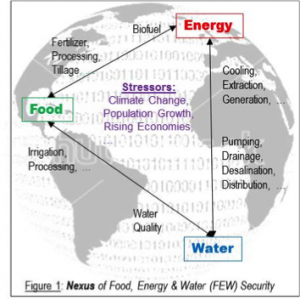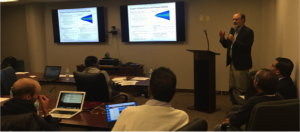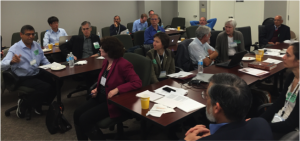The following is a special contribution to this blog from the organizing committee of the National Science Foundation (NSF) workshop to Identify Interdisciplinary Data Science Approaches and Challenges to Enhance Understanding of Interactions of Food Systems with Energy and Water Systems — held during October 5-6, 2015 at the National Institute of Food and Agriculture (NIFA) Waterfront Centre in Washington, DC. This article summarizes some of the highlights of the workshop.
 In the coming decades, the world population is projected to grow significantly resulting in increased strains on the world’s limited food, energy, water and other natural resources. Furthermore, these strains may be amplified due to the effects of global climate change and increasing urbanization. To complicate matters as illustrated in Figure 1, the food, energy, and water systems are coupled through complex interactions. For example, increasing reliance on bio-fuels puts strain on limited land and water resources, hence on food production. Hence, attempts to achieve energy security by increasing the production of biofuels without regard to how it may impact water or food security may lead to unanticipated surprises for food and water security. Indeed, the rise in food prices rose in many parts of the world in 2008 was attributed to increases in subsidies for biofuels. Similarly, incentives to farmers for increasing food production have depleted water resources (e.g., Aral Sea, Ogallala aquifer) and affected water quality (e.g., dead zones in many coastal areas). In recent years, drought and heat affected US nuclear-power production and barge-based coal transportation. Hence, there is a growing recognition of the need for a new approach to understanding the complex the interactions between the food, energy and water subsystems of the food-energy-water nexus as a function of population dynamics, climate change, and other factors.
In the coming decades, the world population is projected to grow significantly resulting in increased strains on the world’s limited food, energy, water and other natural resources. Furthermore, these strains may be amplified due to the effects of global climate change and increasing urbanization. To complicate matters as illustrated in Figure 1, the food, energy, and water systems are coupled through complex interactions. For example, increasing reliance on bio-fuels puts strain on limited land and water resources, hence on food production. Hence, attempts to achieve energy security by increasing the production of biofuels without regard to how it may impact water or food security may lead to unanticipated surprises for food and water security. Indeed, the rise in food prices rose in many parts of the world in 2008 was attributed to increases in subsidies for biofuels. Similarly, incentives to farmers for increasing food production have depleted water resources (e.g., Aral Sea, Ogallala aquifer) and affected water quality (e.g., dead zones in many coastal areas). In recent years, drought and heat affected US nuclear-power production and barge-based coal transportation. Hence, there is a growing recognition of the need for a new approach to understanding the complex the interactions between the food, energy and water subsystems of the food-energy-water nexus as a function of population dynamics, climate change, and other factors.
The food-energy-water nexus is among the highest priorities of the United Nations. It is increasingly figuring among the top priorities of many nations including the US. For example, a recent National Intelligence Council report identified the food-energy-water nexus among the greatest challenges facing our world in the coming decades and a USDOE report listed challenges and opportunities in Water-Energy nexus. The NSF has requested $70M for FY16 to start a multi-year cross-directorate initiative focused on “Innovations at the Nexus of Food, Energy and Water Systems (INFEWS).” This year, the NSF has sponsored a series of workshops aimed at engaging diverse research communities to identify multi-disciplinary INFEWS research challenges (and opportunities). NSF workshop to Identify Interdisciplinary Data Science Approaches and Challenges to Enhance Understanding of Interactions of Food Systems with Energy and Water Systems was— held during October 5-6, 2015 at the National Institute of Food and Agriculture (NIFA) in Washington, DC. The participants included about fifty scholars with broad-ranging expertise across the data sciences and the food, energy and water (FEW) sciences.
 The opening day morning program started with a panel on Data-Driven FEW Nexus Science and Application Innovations. The panel included presentations on the energy-water nexus, the water-food nexus, the food-energy nexus as well as the FEW nexus as a whole. The NIFA director, Dr. Sonny Ramaswamy emphasized the immediacy of food security by drawing attention to the reality that, in the US, millions of children go to bed hungry every day. Mr. Bob Vallario, Dr. Rich Alexander, Dr. Luis Tupas discussed some of the data-driven approaches (e.g., empirical, mechanistic, optimization, and their ensembles) to energy-water, food-water and food-energy interactions. Prof. Rabi Mohtar discussed the data-driven methods of life-cycle analysis for projecting the impact of population growth on demand of food, energy and water. Prof. Rattan Lal, a member of the Nobel prize-winning IPCC team, emphasized the need for new thinking in meeting the nutritional needs of a growing population without increasing the burden on the planet’s scarce land, water, and energy resources, e.g., through better dietary choices. Remembering the lessons of Dust Bowl, he also underscored the need for better soil management by moderating use of tilling, fertilizers, pesticides, and biomass removal using an analogy– while one aspirin may relieve a headache, 20 aspirins could kill a person.
The opening day morning program started with a panel on Data-Driven FEW Nexus Science and Application Innovations. The panel included presentations on the energy-water nexus, the water-food nexus, the food-energy nexus as well as the FEW nexus as a whole. The NIFA director, Dr. Sonny Ramaswamy emphasized the immediacy of food security by drawing attention to the reality that, in the US, millions of children go to bed hungry every day. Mr. Bob Vallario, Dr. Rich Alexander, Dr. Luis Tupas discussed some of the data-driven approaches (e.g., empirical, mechanistic, optimization, and their ensembles) to energy-water, food-water and food-energy interactions. Prof. Rabi Mohtar discussed the data-driven methods of life-cycle analysis for projecting the impact of population growth on demand of food, energy and water. Prof. Rattan Lal, a member of the Nobel prize-winning IPCC team, emphasized the need for new thinking in meeting the nutritional needs of a growing population without increasing the burden on the planet’s scarce land, water, and energy resources, e.g., through better dietary choices. Remembering the lessons of Dust Bowl, he also underscored the need for better soil management by moderating use of tilling, fertilizers, pesticides, and biomass removal using an analogy– while one aspirin may relieve a headache, 20 aspirins could kill a person.
The afternoon panel on Data Science started with a talk by Prof. J. Zico Kolter on new approaches to prediction and control under uncertainty the context of sustainable energy. Prof. Chandra Krintz discussed open-source precision agriculture and challenged the community to develop smart-farm apps to automate routine agriculture data-analytics tasks. AAAI President Prof. Tom Dietterich listed a variety of machine learning challenges including modeling of precipitation, which is clumped in space and time. Computing Community Consoritum (CCC) Council Member, Prof. Vasant Honavar, highlighted informatics challenges in closing the loop from data to model to hypotheses to prediction to observation and experimentation towards understanding the FEW nexus. Prof. Inna Kouper discussed data quality and trustworthiness issues e.g., missing or unreliable data, in some regions of the world. Dr. Bradley Doorn, ASPRS Ex-President, shared remote sensing trends in the context of mapping global surface water.
 The morning panel was followed by a breakout discussion to identify pressing critical science questions, promising quantitative methods, and the data as well as the data science gaps that need to be addressed to meet the societal needs for food, energy, and water security. The afternoon panel was followed by a breakout discussion to identify the limitations of the current state-of-the-art in the data sciences, the research challenges that need to be addressed to overcome the limitations. The workshop concluded with a reflection and a synthesis which underscored the need for, and the benefits of cross-disciplinary research collaborations spanning the FEW sciences and the data sciences and articulated the data sciences research challenges and opportunities in the context of the FEW nexus.
The morning panel was followed by a breakout discussion to identify pressing critical science questions, promising quantitative methods, and the data as well as the data science gaps that need to be addressed to meet the societal needs for food, energy, and water security. The afternoon panel was followed by a breakout discussion to identify the limitations of the current state-of-the-art in the data sciences, the research challenges that need to be addressed to overcome the limitations. The workshop concluded with a reflection and a synthesis which underscored the need for, and the benefits of cross-disciplinary research collaborations spanning the FEW sciences and the data sciences and articulated the data sciences research challenges and opportunities in the context of the FEW nexus.
The workshop identified several research directions including new approaches to: 1) Integration of datasets and data-driven models of multiple types at many spatial and temporal scales, 2) Predictive and causal modeling of spatial and temporal data, with particular attention to auto-correlation, non-stationarity, and scale of FEW data, 3) Multi-stakeholder decision support, including methods for eliciting and sharing preferences, supporting negotiation and consensus building, 4) FEW nexus lifecycle thinking, and 5) FEW data uncertainty, incompleteness and bias. The workshop also underscored the need for community infrastructure (shared data sets, evaluation metrics, models, tools), and the training of a new generation of scientists with the requisite training in the Data Sciences and the FEW sciences to facilitate progress at their interface. Addressing these challenges could not only lead to transformative advances in our understanding of the complex interactions underlying the FEW nexus but also produce innovations in the data sciences that could benefit many other areas of national need that require uncovering complex interactions between natural as well as human processes at multiple spatial and temporal scales, e.g., health, poverty, humanitarian crises, etc. The resulting data sciences methods and tools could dramatically improve the efficiency and sustainability of agriculture, influence consumer behavior in ways that contribute to increased food, energy, and water security, inform management practices for sustainability and productivity of soils including restoration of degraded soils and ecosystems, inform policies aimed at enabling sustainable FEW systems and provide strategies for mitigating the adverse effects of climate change.
A few recent developments have emerged since this blog was posted. First, recent NSF Research Traineeship solicitation 16-503 listed INFEWS as a priority area. Second, NCSE is organizing a national conference (January 19-21 2016) with a session on data science challenges in food-energy-water nexus.









